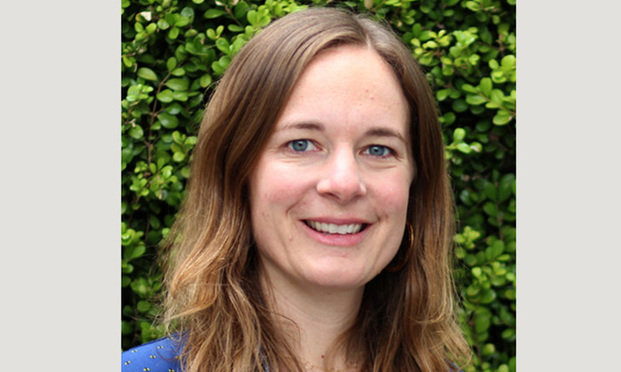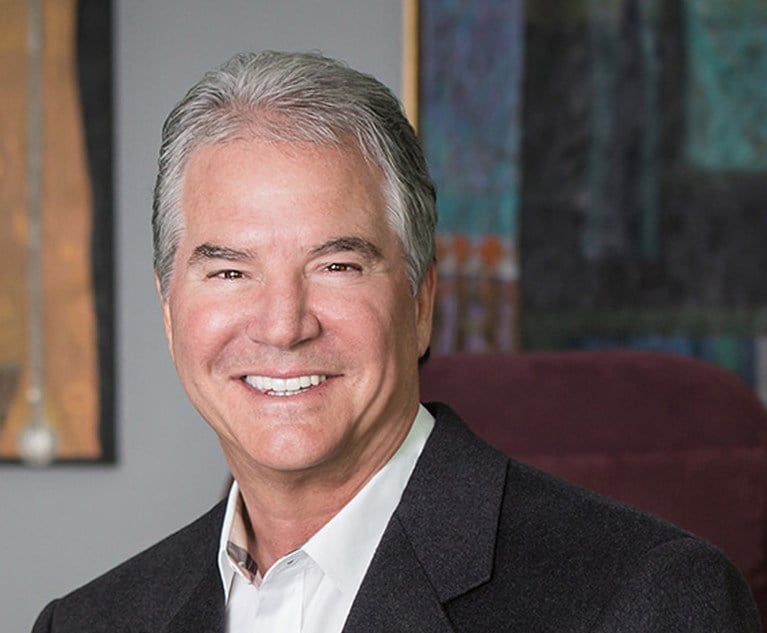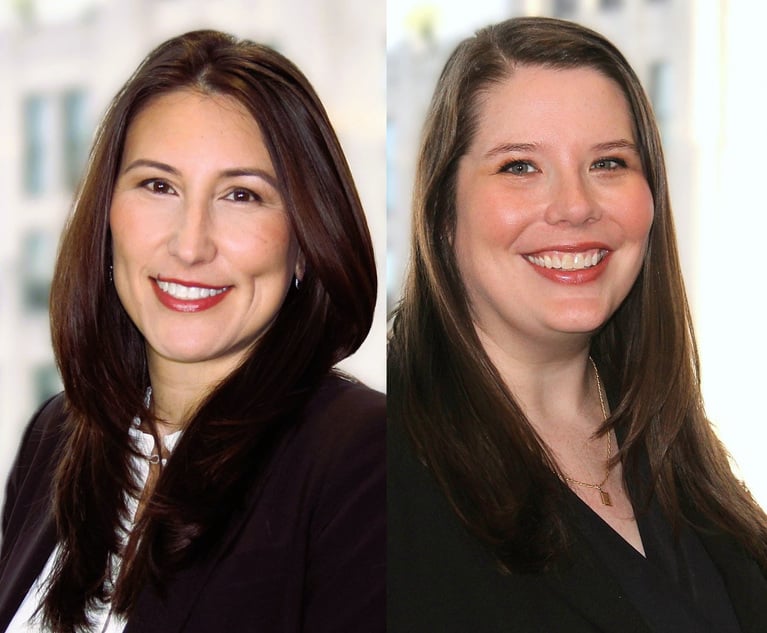Bittersweet: When a Loss Is Actually a Win
Though the headlines about the Ninth Circuit case would suggest otherwise, requiring warnings about the health harms of soda and other sugary drinks remains a viable and critical strategy.
February 11, 2019 at 09:00 AM
6 minute read
 Sabrina Adler, an attorney with Oakland-based nonprofit ChangeLab Solutions (Photo: Courtesy Photo)
Sabrina Adler, an attorney with Oakland-based nonprofit ChangeLab Solutions (Photo: Courtesy Photo)
“Federal Appeals Court Blocks San Francisco Law on Ad Warnings for Sugary Drinks.” “Court Strikes Down San Francisco's Soda Health Warnings.” “11-Judge Appeals Court Panel Overturns Soda Warning, Citing U.S. Supreme Court.”
These headlines sum up the media's reaction to a January 30 ruling of an en banc panel of the Ninth Circuit Court of Appeals. Reading them, it would be logical to assume that San Francisco had suffered a devastating loss in court.
When you take a deeper look at the ruling, however, it's about as good a “loss” as San Francisco—and the public health community—could have hoped for.
Let's start from the beginning. In 2015, San Francisco's board of supervisors voted unanimously to require certain sugary drink advertisements, such as billboards and signs, to include the following statement: “WARNING: Drinking beverages with added sugar(s) contributes to obesity, diabetes, and tooth decay. This is a message from the City and County of San Francisco.” The warning statement would have to occupy at least 20 percent of the advertisement and be placed within a rectangular border.
The law was enacted in response to overwhelming evidence that, both locally and nationwide, sugary drinks are making us sick. A clear and compelling body of evidence links sugary drink consumption to chronic diseases like type 2 diabetes, obesity, and heart, liver, and dental diseases. Yet about half of adults, two-thirds of youth, and one-third of toddlers (babies 1-2 years old!) in the United States consume at least one sugary drink every day.
Health warnings are one of the best strategies for educating people about the risks of what they consume. Warning labels on tobacco products and advertisements, for example, have proven not only effective but also legally sound. The same is true for sugary drink labels. A recent study showed that parents were significantly less likely to choose a sugary drink for their child when that drink was labeled with a warning similar to the one required by San Francisco's law.
Perhaps because health warnings are so effective, Big Soda swiftly took San Francisco to court. They challenged the warning requirement on First Amendment grounds, claiming that it compelled the beverage companies to speak against their will and in a way that violated the companies' constitutional rights. The case made its way through the federal court system, eventually landing in front of an en banc panel of the Ninth Circuit.
Technically, the panel sided with the beverage industry, but not nearly to the degree that the headlines suggest. The court took no issue with the idea of a warning requirement, nor even with the specific warning language. The court was only concerned that, at least based on the evidence before it, the required warning may pose an undue burden on companies' free speech (yes, the companies' free speech rights) due to its size.
Text size is very fixable problem. San Francisco has several options at its disposal. Most simply, it can amend the law to require that the warning take up less space. Or it can establish a more thorough record on why a 20 percent standard is justified and necessary to get San Franciscans to fully understand the risks associated with sugary drinks. While there is no guarantee that a court would accept a smaller warning or a warning backed by more evidence, of all the problems the court could have had with the law, text size is by far the simplest to address.
Another critical yet underreported element of the ruling is the court's unmistakable recognition that governments should and still do have substantial leeway when it comes to laws requiring businesses to disclose factual and uncontroversial information. A recent Supreme Court case that addressed disclosure requirements for so-called “crisis pregnancy centers” created some confusion about what standard of review should apply to such requirements, but the Ninth Circuit opinion is clear: as long as the law is reasonable (that's where the size comes in), warning requirements are permissible. In other words, the FDA can continue to require health warnings on tobacco products, and the state of California can continue to require companies to disclose potential carcinogens in their products. Similarly, states and cities should also be able to require Big Soda to warn of the relationship between consuming sugary drinks and health problems such as type 2 diabetes, obesity, and tooth decay.
The ability of state and local governments to require sugary drink warnings is all the more important in light of industry-fueled efforts to thwart localities' efforts to protect the health of their residents. Recently, beverage industry lobbyists strong-armed the California legislature into enacting a bill that prohibits cities from enacting new local sugary drink taxes through 2030, meaning that the only option for a new sugary drink tax in California is at the state level. Similar attempts to prohibit local sugary drink taxes through preemption (as this underhanded tactic is called) have recently passed in other states and continue to percolate. In spite of sugary drink taxes' proven effectiveness—or, perhaps, because of it—industry is fighting tooth and nail to prevent local governments from even considering such taxes as an option, leaving warnings as a critical strategy.
San Francisco is not alone in recognizing the value of health warnings. New York City legislators have proposed requiring warnings about the amount of added sugars in restaurant meals. California's legislature is considering requiring warnings directly on soda cans and bottles. Hawaii, New York, Baltimore, and other states and cities also have considered warnings for sugary drinks. This momentum is aligned with public opinion; surveys show that the public wants this information. One poll found that 78 percent of California voters support requiring beverage companies to post health warnings on soda and other sugary drinks.
Though the headlines about the Ninth Circuit case would suggest otherwise, requiring warnings about the health harms of soda and other sugary drinks remains a viable and critical strategy. Even the beverage industry admits that education can be an effective tool to lower sugary drink consumption. We couldn't agree more. That's exactly what warning labels are all about.
Sabrina Adler is a senior attorney and program director at ChangeLab Solutions, an Oakland, CA–based nonprofit devoted to improving health through legal- and policy-based solutions. ChangeLab Solutions created the model law requiring sugary drink warning labels on which San Francisco's law is based.
Read more:
Court Blocks San Francisco's Push to Put Warning Labels on Ads for Sugary Drinks
This content has been archived. It is available through our partners, LexisNexis® and Bloomberg Law.
To view this content, please continue to their sites.
Not a Lexis Subscriber?
Subscribe Now
Not a Bloomberg Law Subscriber?
Subscribe Now
NOT FOR REPRINT
© 2025 ALM Global, LLC, All Rights Reserved. Request academic re-use from www.copyright.com. All other uses, submit a request to [email protected]. For more information visit Asset & Logo Licensing.
You Might Like
View All
The Rise of Female Breadwinners: Challenging Traditional Divorce Dynamics
4 minute read
An Overview of Proposed Changes to the Federal Rules of Procedure Relating to the Expansion of Remote Trial Testimony
15 minute read
Assessing the Second Trump Presidency’s Impact on College Sports

Cybersecurity Breaches, Cyberbullying, and Ways to Help Protect Clients From Both
7 minute readTrending Stories
Who Got The Work
J. Brugh Lower of Gibbons has entered an appearance for industrial equipment supplier Devco Corporation in a pending trademark infringement lawsuit. The suit, accusing the defendant of selling knock-off Graco products, was filed Dec. 18 in New Jersey District Court by Rivkin Radler on behalf of Graco Inc. and Graco Minnesota. The case, assigned to U.S. District Judge Zahid N. Quraishi, is 3:24-cv-11294, Graco Inc. et al v. Devco Corporation.
Who Got The Work
Rebecca Maller-Stein and Kent A. Yalowitz of Arnold & Porter Kaye Scholer have entered their appearances for Hanaco Venture Capital and its executives, Lior Prosor and David Frankel, in a pending securities lawsuit. The action, filed on Dec. 24 in New York Southern District Court by Zell, Aron & Co. on behalf of Goldeneye Advisors, accuses the defendants of negligently and fraudulently managing the plaintiff's $1 million investment. The case, assigned to U.S. District Judge Vernon S. Broderick, is 1:24-cv-09918, Goldeneye Advisors, LLC v. Hanaco Venture Capital, Ltd. et al.
Who Got The Work
Attorneys from A&O Shearman has stepped in as defense counsel for Toronto-Dominion Bank and other defendants in a pending securities class action. The suit, filed Dec. 11 in New York Southern District Court by Bleichmar Fonti & Auld, accuses the defendants of concealing the bank's 'pervasive' deficiencies in regards to its compliance with the Bank Secrecy Act and the quality of its anti-money laundering controls. The case, assigned to U.S. District Judge Arun Subramanian, is 1:24-cv-09445, Gonzalez v. The Toronto-Dominion Bank et al.
Who Got The Work
Crown Castle International, a Pennsylvania company providing shared communications infrastructure, has turned to Luke D. Wolf of Gordon Rees Scully Mansukhani to fend off a pending breach-of-contract lawsuit. The court action, filed Nov. 25 in Michigan Eastern District Court by Hooper Hathaway PC on behalf of The Town Residences LLC, accuses Crown Castle of failing to transfer approximately $30,000 in utility payments from T-Mobile in breach of a roof-top lease and assignment agreement. The case, assigned to U.S. District Judge Susan K. Declercq, is 2:24-cv-13131, The Town Residences LLC v. T-Mobile US, Inc. et al.
Who Got The Work
Wilfred P. Coronato and Daniel M. Schwartz of McCarter & English have stepped in as defense counsel to Electrolux Home Products Inc. in a pending product liability lawsuit. The court action, filed Nov. 26 in New York Eastern District Court by Poulos Lopiccolo PC and Nagel Rice LLP on behalf of David Stern, alleges that the defendant's refrigerators’ drawers and shelving repeatedly break and fall apart within months after purchase. The case, assigned to U.S. District Judge Joan M. Azrack, is 2:24-cv-08204, Stern v. Electrolux Home Products, Inc.
Featured Firms
Law Offices of Gary Martin Hays & Associates, P.C.
(470) 294-1674
Law Offices of Mark E. Salomone
(857) 444-6468
Smith & Hassler
(713) 739-1250






